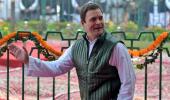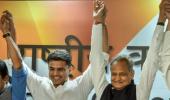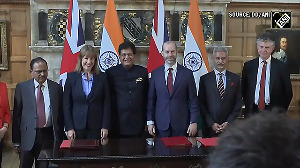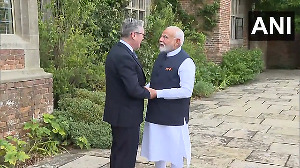'The 2019 battle is a battle for the kind of India that we want to live in.'
The Congress's long history is pockmarked with sins great and small, but Mr Gandhi has the advantage of representing a new generation with a relatively clean slate, and a chance to redefine contemporary perception,' says Mitali Saran.
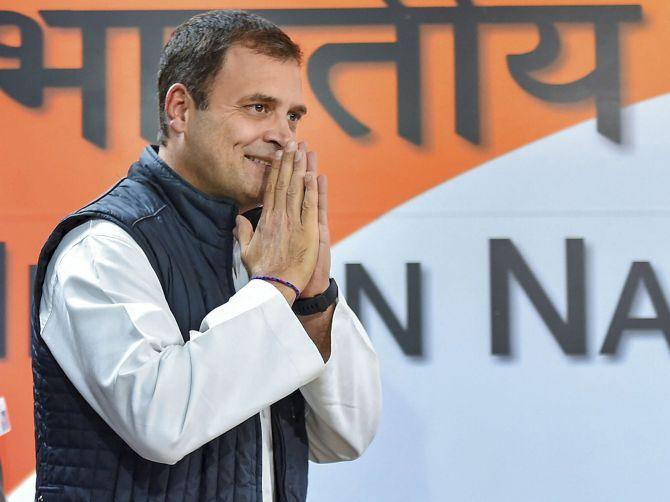
The next morning the Congress would emerge with the most seats in Madhya Pradesh. Photograph: Kamal Kishore/PTI Photo
Well, that was a heck of an election.
It began as a regular nail-biter, but after a day of see-sawing results through excruciatingly slow counting, if you didn't find yourself still in your pyjamas at 5 am, frozen in front of a screen with round, desiccated eyes, and hair standing on end, you're a better-adjusted citizen than I.
For those Indians who abhor the Hindu supremacist agenda and control freak tics of the Rashtriya Swayamsevak Sangh and the Bharatiya Janata Party, watching the huge swathes of Rajasthan, Madhya Pradesh, and Chhattisgarh slip out of their grasp has been the most heartening event since 2014.
After crunching the numbers -- the BJP 0/5, the Congress 3/5 -- Amit Anilchandra Shah declared that 'The Congress may have won, but the BJP has not lost these polls,' which is almost more creative than the BJP's GDP number-crunching.
After four-and-a-half years of this smug dispensation, with its hate-filled rhetoric, obfuscation, fake news, lawlessness, destruction of institutions, and mob violence, secular-liberal India is allowed a little schadenfreude.
Twitter came up with some beauts, like the thread showing how the Congress candidate beat the BJP candidate in places where the PM campaigned, or cartoonist Sandeep Adhwaryu's frame showing a common man giving the one-fingered salute to a fearsome column of tanks labelled 'News Warriors'.
There was also a deafening silence. 'Have the trolls stopped screaming, Clarice?' tweeted Prasanto K Roy.
But after schadenfreude comes reality and the reality is that the newly-appointed Madhya Pradesh chief minister is a man tainted by allegations of involvement in the 1984 riots.
Whataboutery immediately switched sides, smooth as butter -- questions about Kamal Nath are being countered with 'What about 2002?' to which the only sane response is to hold one's head in one's hands.
Rahul Gandhi comes out of these elections looking like a serious contender. The BJP PR-manufactured Pappu tag is history, and what does from here on in will be scrutinised rather than dismissed.
Despite enduring brutal vilification he has championed a kinder, gentler politics and rhetoric, without letting up on his opponents.
By and large he has stayed on message, flagging farmer distress, the lack of jobs, and crony capitalism and corruption in the Rafale deal -- which, despite the Supreme Court's dismissal of petitioners seeking a probe, will remain a live issue as long as the Opposition keeps pressing for a Joint Parliamentary Committee probe.
Rahul has brought the Congress back into the game.
Perhaps he achieved this because right next to the kinder, gentler politics is a streak of cold pragmatism. We saw it in his pivot to Hindu-positivity alongside a virtual silence on minorities in the Gujarat state election, which gave the BJP such a fright that they are still losing their minds over whose gotra is better.
Cold pragmatism can be very useful, but it can also rub up against, and occasionally eclipse, principle. The trade-off will not always be worth it.
And not even an endorphin-addled election victory, not even a desperate wish for the end of the BJP's stranglehold on India, can make Mr Nath's appointment look good.
Those who do not forgive Mr Modi for his role in the Gujarat riots will find it equally impossible to whitewash Mr Nath, whom eyewitnesses place with the mob at Rakabganj gurdwara that burnt two Sikhs alive in 1984.
Perception is everything in politics, and while the BJP cannot make much capital of this issue, given its idolatry of people like PM Modi and Ajay Singh Bisht, chief minister of Uttar Pradesh, citizens might -- and should -- care.
The 2019 battle is a battle for the kind of India that we want to live in.
If the Congress is to set itself up as an ideological opponent of the BJP-RSS, it must be seen to embody that ideology.
The party's long history is pockmarked with sins great and small, but Mr Gandhi has the advantage of representing a new generation with a relatively clean slate, and a chance to redefine contemporary perception.
Ashok Gehlot's appointment as CM in Rajasthan might piss off those impatient for fresh faces, but there is logic in having an experienced hand steer the state into the 2019 electoral dust-up.
If Mr Nath has been chosen for the same reason, in the service of a larger battle, that throws up three unpleasant possibilities.
One, the Congress agrees with Mr Modi that getting the job done is more important than how you get the job done.
Two, the Congress sees nothing wrong with Mr Nath.
Three, nobody, including voters, sees anything wrong with Mr Nath, in which case the country has crossed a line we will not recover from.
Either way, the election victory feels dampened by the fact that the Congress is setting itself up not as an ideological opponent of the BJP, but as just another rival for political power.


